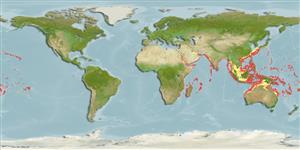>
Eupercaria/misc (Various families in series Eupercaria) >
Lutjanidae (Snappers) > Etelinae
Etymology: Pristipomoides: Greek, pristis = saw + Greek, poma, -atos = cover, operculum + Greek, oides = similar to (Ref. 45335).
More on author: Valenciennes.
Environment: milieu / climate zone / depth range / distribution range
ນິເວດວິທະຍາ
ສັດທະເລ ກ່ຽວກັບ (ຢູ່)ເທິງຊັ້ນພື້ນດິນໃນທະເລເປີດ; ລະດັບຄວາມເລິກ 40 - 400 m (Ref. 11888), usually 180 - 270 m (Ref. 9821). Deep-water; 35°N - 26°S, 31°E - 144°W (Ref. 55)
Indo-Pacific: East Africa to Hawaii and Tahiti, north to southern Japan, south to eastern Australia and Lord Howe Island.
Length at first maturity / ຂະໜາດ / ນ້ຳໜັກ / Age
Maturity: Lm 52.0, range 37 - ? cm
Max length : 100.0 cm TL ຕົວຜູ້/ບໍ່ມີເພດ; (Ref. 5484); common length : 50.0 cm SL ຕົວຜູ້/ບໍ່ມີເພດ; (Ref. 9821); ນ້ຳໜັກສູງສຸດທີ່ເຄຍຈັດພີມມາ: 8.2 kg (Ref. 4887); ອາຍຸສູງສຸດທີ່ເຄຍລາຍງານມາ: 44 ປີ (Ref. 92301)
ຄີ (ໜາມ)ແຂງຢູ່ຫຼັງປາ (ທັງໝົດ): 10; ຄີຫຼັງຂອງປາ (ຄີອ່ອນ) (ທັງໝົດ): 11; ຄີ(ໜາມ) ແຂງຢູ່ຄີກົ້ນປາ
ກຸ່ມປາກະດູກແຂງ
ຄວາມຖີ່ຂອງກຸ່ມຖ່າຍທອດພັນ
ປາທີ່ມີການເຄື່ອນຍ້າຍຈາກທະເລໄປຫານ້ຳຈືດ ແລະນ້ຳຈືດຫາທະເລ
ປາທີ່ມີການເຄື່ອນຍ້າຍຈາກທະເລແລະໄປໄຂ່ຢູ່ນ້ຳຈືດ
ຄີກົ້ນຂອງປາ
ສັດທີ່ມີກະດູກສັນຫັຼງ
ການຖ່າຍທອດທາງກຳມະພັນຈາກພໍ່ແມ່ຫາລູກ 3; ຄີກົ້ນຂອງປາ: 8. This species is distinguished by the following characters: body elongate, laterally compressed; jaws about equal or lower jaw protruding slightly; premaxillae protrusible. maxilla extending to vertical through about anterior margin of pupil; upper and lower jaws both with an outer row of conical to small canine teeth and an inner band of villiform teeth, the caniniform teeth at anterior ends of jaws are not appreciably enlarged; teeth on vomer triangular patch, maxilla without scales or longitudinal ridges; interorbital region flattened. Gill rakers on first gill arch 7-8 + 15-18 = 22-26; last soft ray of both dorsal and anal fins well
produced, longer than next to last ray; caudal fin forked; pectoral fins long, about equal to or somewhat shorter than head length; membranes of dorsal and anal fins without scales; tubed
lateral-line scales 57-62. Colour variable, ranging from brownish to lavender or reddish
purple; snout and interorbital space with narrow yellow lines and blue spots often persisting as dark spots when preserved; dorsal and caudal fins light blue or lavender with reddish orange margins (Ref. 9821).
Adults occur over rocky bottoms (Ref. 30573); off Guam, caught most abundantly between 180 and 270 m (Ref. 9821). At night, they migrate vertically to the upper part of its habitat to feed (Ref. 11888). They feed on small fishes, shrimps, crabs, amphipods, ascidians and salps. Marketed fresh (Ref. 55). Caught mainly with bottom longlines and deep handlines, marketed main fresh and a good quality food fish (Ref. 9821).
Life cycle and mating behavior
ການຈະເລີນເຕັມໄວ | ການສືບພັນ | ການວາງໄຂ່ | ໄຂ່ | ຄວາມດົກຂອງໄຂ່ປາ | ຕົວອ່ອນ
Allen, G.R., 1985. FAO Species Catalogue. Vol. 6. Snappers of the world. An annotated and illustrated catalogue of lutjanid species known to date. FAO Fish. Synop. 125(6):208 p. Rome: FAO. (Ref. 55)
IUCN Red List Status (Ref. 130435)
Threat to humans
Harmless
Human uses
ການປະມົງ: ທີ່ມີການຄ້າສູງ; ຊະນິດປາທີ່ຖືກນຳໃຊ້ເຂົ້າໃນການຫາເພື່ອເປັນເກມກິລາ: ແມ່ນ
ຂໍ້ມູນຕື່ມອີກ
ເອກະສານອ້າງອີງການລ້ຽງສັດນ້ຳຂໍ້ມູນການລ້ຽງສັດນ້ຳສາຍພັນກຳມະພັນElectrophoresesການຖ່າຍທອດທາງກຳມະພັນຈາກພໍ່ແມ່ຫາລູກພະຍາດການປຸງແຕ່ງNutrientsMass conversion
ເຄື່ອງມື
Special reports
Download XML
ແຫຼ່ງອີນເຕີເນັດ
Estimates based on models
Preferred temperature (Ref.
123201): 12.2 - 22.6, mean 15 °C (based on 199 cells).
Phylogenetic diversity index (Ref.
82804): PD
50 = 0.5005 [Uniqueness, from 0.5 = low to 2.0 = high].
Bayesian length-weight: a=0.01072 (0.00753 - 0.01526), b=2.93 (2.83 - 3.03), in cm total length, based on LWR estimates for this species (Ref.
93245).
ຊັ້ນເຂດຮ້ອນ (Ref.
69278): 4.2 ±0.4 se; based on diet studies.
Generation time: 4.4 (3.5 - 10.0) years. Estimated as median ln(3)/K based on 14
growth studies.
ຄວາມຢືດຢຸ່ນ (Ref.
120179): ຂະໜາດກາງ, ປະຊາກອນຕຳ່ສຸດທີ່ໃຊ້ເວລາສອງເທົ່າ 1.4 - 4.4 ປີ (K=0.16-0.31; tmax=18).
Prior r = 0.56, 95% CL = 0.37 - 0.84, Based on 2 stock assessments.
Fishing Vulnerability (Ref.
59153): Moderate vulnerability (43 of 100).
Climate Vulnerability (Ref.
125649): High to very high vulnerability (75 of 100).
Nutrients (Ref.
124155): Calcium = 12.9 [6.3, 32.6] mg/100g; Iron = 0.303 [0.131, 0.673] mg/100g; Protein = 16.9 [14.9, 18.7] %; Omega3 = 0.221 [0.100, 0.484] g/100g; Selenium = 23.1 [9.1, 58.0] μg/100g; VitaminA = 16.3 [3.2, 89.0] μg/100g; Zinc = 0.299 [0.191, 0.484] mg/100g (wet weight);
